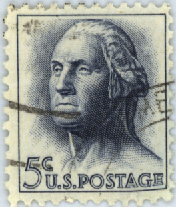FRtR > Outlines > American History (1990) > Chapter Three > Washington retires (8/11)
An Outline of American History (1990)
Chapter Three
Washington retires (8/11)
< Previous Page * Next Page >
Jay's treaty caused general dissatisfaction, but as the end of
Washington's second administration approached, it was evident
that marked progress had been made in other fields. The
government had been organized, national credit established, maritime
commerce fostered, the Northwest Territory recovered, and peace
preserved.
 Washington
retired in 1797, firmly declining to serve for
more than eight years at the nation's head. His Vice President,
John Adams of Massachusetts, was elected the new
President.
Even before he entered the Presidency, Adams had quarreled
with Alexander Hamilton - who had contributed much
to the
previous administration - and thus was handicapped by a divided
party. These domestic difficulties were compounded by
international complications: France, angered by Jay's recent treaty with
Britain, refused to accept Adams' minister. When Adams sent
three other commissioners to Paris, and they too were rejected,
American indignation rose to an excited pitch. Troops were
enlisted, the navy was strengthened, and, in 1799, after a series of
sea battles with the French in which American ships were
victorious, war seemed inescapable. In this crisis, Adams thrust aside
the guidance of Hamilton, who wanted war, and sent a new minister
to France. Napoleon, who had just come to power,
received
him cordially and the danger of conflict subsided.
Washington
retired in 1797, firmly declining to serve for
more than eight years at the nation's head. His Vice President,
John Adams of Massachusetts, was elected the new
President.
Even before he entered the Presidency, Adams had quarreled
with Alexander Hamilton - who had contributed much
to the
previous administration - and thus was handicapped by a divided
party. These domestic difficulties were compounded by
international complications: France, angered by Jay's recent treaty with
Britain, refused to accept Adams' minister. When Adams sent
three other commissioners to Paris, and they too were rejected,
American indignation rose to an excited pitch. Troops were
enlisted, the navy was strengthened, and, in 1799, after a series of
sea battles with the French in which American ships were
victorious, war seemed inescapable. In this crisis, Adams thrust aside
the guidance of Hamilton, who wanted war, and sent a new minister
to France. Napoleon, who had just come to power,
received
him cordially and the danger of conflict subsided.
< Previous Page * Next Page >
 Washington
retired in 1797, firmly declining to serve for
more than eight years at the nation's head. His Vice President,
John Adams of Massachusetts, was elected the new
President.
Even before he entered the Presidency, Adams had quarreled
with Alexander Hamilton - who had contributed much
to the
previous administration - and thus was handicapped by a divided
party. These domestic difficulties were compounded by
international complications: France, angered by Jay's recent treaty with
Britain, refused to accept Adams' minister. When Adams sent
three other commissioners to Paris, and they too were rejected,
American indignation rose to an excited pitch. Troops were
enlisted, the navy was strengthened, and, in 1799, after a series of
sea battles with the French in which American ships were
victorious, war seemed inescapable. In this crisis, Adams thrust aside
the guidance of Hamilton, who wanted war, and sent a new minister
to France. Napoleon, who had just come to power,
received
him cordially and the danger of conflict subsided.
Washington
retired in 1797, firmly declining to serve for
more than eight years at the nation's head. His Vice President,
John Adams of Massachusetts, was elected the new
President.
Even before he entered the Presidency, Adams had quarreled
with Alexander Hamilton - who had contributed much
to the
previous administration - and thus was handicapped by a divided
party. These domestic difficulties were compounded by
international complications: France, angered by Jay's recent treaty with
Britain, refused to accept Adams' minister. When Adams sent
three other commissioners to Paris, and they too were rejected,
American indignation rose to an excited pitch. Troops were
enlisted, the navy was strengthened, and, in 1799, after a series of
sea battles with the French in which American ships were
victorious, war seemed inescapable. In this crisis, Adams thrust aside
the guidance of Hamilton, who wanted war, and sent a new minister
to France. Napoleon, who had just come to power,
received
him cordially and the danger of conflict subsided.